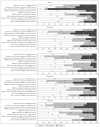Monkeypox Knowledge and Confidence in Diagnosis and Management with Evaluation of Emerging Virus Infection Conspiracies among Health Professionals in Kuwait
- PMID: 36145426
- PMCID: PMC9503328
- DOI: 10.3390/pathogens11090994
Monkeypox Knowledge and Confidence in Diagnosis and Management with Evaluation of Emerging Virus Infection Conspiracies among Health Professionals in Kuwait
Abstract
As the 2022 human monkeypox (HMPX) multi-country outbreak is spreading, the response of healthcare workers (HCWs) is central to mitigation efforts. The current study aimed to evaluate HMPX knowledge and confidence in diagnosis and management among HCWs in Kuwait. We used a self-administered questionnaire distributed in July-August 2022 through a snowball sampling approach. The survey items evaluated HMPX knowledge, confidence in diagnosis and management of the disease, and the belief in conspiracies regarding emerging virus infections (EVIs). The sample size was 896 HCWs: nurses (n = 485, 54.1%), pharmacists (n = 154, 17.2%), physicians (n = 108, 12.1%), medical technicians/allied health professionals (MT/AHP, n = 96, 10.7%), and dentists (n = 53, 5.9%). An overall low level of HMPX knowledge was noticed for items assessing virus transmission and non-cutaneous symptoms of the disease, with higher knowledge among physicians. Approximately one-fifth of the study sample agreed with the false notion that HMPX is exclusive to male homosexuals (n = 183, 20.4%), which was associated with lower knowledge with higher frequency among MT/AHP compared to nurses, physicians, and pharmacists. Confidence levels were low: confidence in diagnosis based on diagnostic tests (n = 449, 50.1%), confidence in the ability to manage the HMPX (n = 426, 47.5%), and confidence in the ability to diagnose HMPX clinically (n = 289, 32.3%). Higher confidence levels were found among nurses and participants with postgraduate degrees. Higher embrace of conspiracy beliefs regarding EVIs was noticed among participants with lower knowledge, and among those who agreed or were neutral/had no opinion regarding the false idea of HMPX exclusive occurrence among male homosexuals, while lower levels of belief in conspiracies were noticed among physicians, dentists, and pharmacists compared to MT/AHP. Variable levels of HMPX knowledge were observed in this study per item, with low level of knowledge regarding virus transmission. Differences in knowledge and confidence levels in diagnosis and management of HMPX should be considered in education and training aiming to prepare for outbreak response. The relatively high prevalence of embracing conspiratorial beliefs regarding EVIs is worrisome and needs proper interventions. The attitude towards male homosexuals' role in monkeypox spread should be evaluated in future studies considering the possibility of stigma and discrimination in this most-at-risk group.
Keywords: epidemic; preparedness; public health emergency of international concern; response.
Conflict of interest statement
The authors declare no conflict of interest.
Figures




Similar articles
-
Assessing Healthcare Workers' Knowledge and Their Confidence in the Diagnosis and Management of Human Monkeypox: A Cross-Sectional Study in a Middle Eastern Country.Healthcare (Basel). 2022 Sep 8;10(9):1722. doi: 10.3390/healthcare10091722. Healthcare (Basel). 2022. PMID: 36141334 Free PMC article.
-
Knowledge, Attitude and Conspiracy Beliefs of Healthcare Workers in Lebanon towards Monkeypox.Trop Med Infect Dis. 2023 Jan 23;8(2):81. doi: 10.3390/tropicalmed8020081. Trop Med Infect Dis. 2023. PMID: 36828497 Free PMC article.
-
Knowledge of Human Monkeypox and Its Relation to Conspiracy Beliefs among Students in Jordanian Health Schools: Filling the Knowledge Gap on Emerging Zoonotic Viruses.Medicina (Kaunas). 2022 Jul 11;58(7):924. doi: 10.3390/medicina58070924. Medicina (Kaunas). 2022. PMID: 35888642 Free PMC article.
-
Neurological manifestations of an emerging zoonosis-Human monkeypox virus: A systematic review.Medicine (Baltimore). 2023 Sep 1;102(35):e34664. doi: 10.1097/MD.0000000000034664. Medicine (Baltimore). 2023. PMID: 37657009 Free PMC article.
-
[Learning from the past: the history of human monkeypox and the atypical multi-country outbreak in 2022].Zhongguo Dang Dai Er Ke Za Zhi. 2022 Jul 15;24(7):717-727. doi: 10.7499/j.issn.1008-8830.2206019. Zhongguo Dang Dai Er Ke Za Zhi. 2022. PMID: 35894184 Free PMC article. Review. Chinese.
Cited by
-
The willingness of healthcare workers to be vaccinated against monkeypox and their knowledge about monkeypox: A systematic review and meta-analysis.Heliyon. 2024 Jul 30;10(15):e35196. doi: 10.1016/j.heliyon.2024.e35196. eCollection 2024 Aug 15. Heliyon. 2024. PMID: 39170212 Free PMC article.
-
Perceptions and Knowledge of Public Towards Emerging Human Monkeypox in Yemen: A Cross-Sectional Study.J Multidiscip Healthc. 2023 Nov 30;16:3689-3701. doi: 10.2147/JMDH.S442296. eCollection 2023. J Multidiscip Healthc. 2023. PMID: 38058461 Free PMC article.
-
Integrated Analgesic Care in the Current Human Monkeypox Outbreak: Perspectives on an Integrated and Holistic Approach Combining Old Allies with Innovative Technologies.Medicina (Kaunas). 2022 Oct 15;58(10):1454. doi: 10.3390/medicina58101454. Medicina (Kaunas). 2022. PMID: 36295614 Free PMC article.
-
Monkeypox Cross-Sectional Survey of Knowledge, Attitudes, Practices, and Willingness to Vaccinate among University Students in Pakistan.Vaccines (Basel). 2022 Dec 31;11(1):97. doi: 10.3390/vaccines11010097. Vaccines (Basel). 2022. PMID: 36679942 Free PMC article.
-
Knowledge, Attitudes, and Willingness of Healthcare Workers in Iraq's Kurdistan Region to Vaccinate against Human Monkeypox: A Nationwide Cross-Sectional Study.Vaccines (Basel). 2023 Nov 21;11(12):1734. doi: 10.3390/vaccines11121734. Vaccines (Basel). 2023. PMID: 38140139 Free PMC article.
References
-
- Vaughan A., Aarons E., Astbury J., Balasegaram S., Beadsworth M., Beck C.R., Chand M., O’Connor C., Dunning J., Ghebrehewet S., et al. Two cases of monkeypox imported to the United Kingdom, September 2018. Eurosurveillance. 2018;23:1800509. doi: 10.2807/1560-7917.ES.2018.23.38.1800509. - DOI - PMC - PubMed
-
- Petersen E., Abubakar I., Ihekweazu C., Heymann D., Ntoumi F., Blumberg L., Asogun D., Mukonka V., Lule S.A., Bates M., et al. Monkeypox-Enhancing public health preparedness for an emerging lethal human zoonotic epidemic threat in the wake of the smallpox post-eradication era. Int. J. Infect. Dis. 2019;78:78–84. doi: 10.1016/j.ijid.2018.11.008. - DOI - PMC - PubMed
LinkOut - more resources
Full Text Sources
Research Materials

